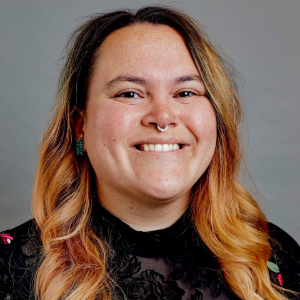As both a scientific and legal researcher, Carly Camplain, Ph.D. is changing the face of public health law for Indigenous people nationwide. An assistant professor in the Department of Applied Health Science, Dr. Camplain received the Early Career Award for Excellence in Public Health Law at the annual conference of the American Public Health Association (APHA). This award is given annually to only one APHA member nationwide who has made significant contributions to the field of public health law through research, teaching and mentoring, practice or advocacy.
Dr. Camplain utilizes interdisciplinary research across public health, law, and criminal justice with an aim to develop the criminal legal system into an environment that encourages healing and cultural values—and minimizes harm.
“Receiving this award has been both humbling and motivating,” shares Dr. Camplain. “It’s a reminder that my hard work is being recognized and that I need to continue striving for meaningful change.”
Dr. Camplain is dedicated to producing “adaptable” research, striving for a tailored approach to the specific needs of diverse communities. Although Dr. Camplain works with all walks of life, her specialty is on Indigenous people, native nations, and correctional facilities in Indian Country, and she is a member of the IUB Professional Chapter of the Society for Advancement of Chicanos/Hispanics and Native Americans in Science (SACNAS).
“Many people in public health don’t have formal legal training, and law is fundamentally distinct from policy,” says Dr. Camplain. “Policy outlines what should be done, while law governs what must be done, how it is interpreted, and how it is enforced. These factors have profound impacts on health, often exacerbating inequities.”
Some of the biggest challenges in the field of public health law when it comes to native nations/tribes is the issue of sovereignty, meaning they have the right to self-govern but face highly specific challenges navigating federal, state, and tribal systems.
“These overlapping jurisdictions create complexities, especially when it comes to health and criminal-legal issues,” notes Dr. Camplain. “Many people are unaware of this sovereignty or its implications. For example, Federal Indian Law fails to consider the cultural, legal, and health needs of Indigenous communities, perpetuating inequities.”

The key to working with these native nations is showing proper respect for their sovereignty, traditions, and governance structures, notes Dr. Camplain. With the combination of law and science, she can work directly with these specific community groups to work towards lasting and impactful change.
As an educator, Dr. Camplain utilizes mentorship to create inclusive and meaningful research experiences in the classroom. She currently works with graduate students on a legal epidemiology project that allows them to explore complex issues—and learn how the law impacts public health— while taking an active role in shaping their careers.
“Despite Indiana’s history as home to many native nations, there are no federally recognized tribes in the state, which further limits public awareness of these issues,” says Dr. Camplain. “National recognition like this strengthens my ability to establish myself as a leader in the field, further advancing my contributions as both a researcher and an instructor here at SPH-B.”
For more inspiring stories about SPH-B students, faculty, and staff, visit go.iu.edu/48bx.


